Interview by Genesis Evans
Collages by Requiem for a Screen via scans from Chromeball
Intro by QS
Mythology has become an accessible commodity. Fifteen years ago, the people who shaped a generation’s manner of approaching the world on a skateboard were confined to hard media with dwindling circulation. Half of my age group grew up hearing the holy words “Tom Penny” for years, without seeing anything until Menik Mati came out. Today, mythology is a click away; you can tend to your old soul without going far. The full spectrum of inspiration is available.
Ray Barbee, for this same reason, has become even more of an inspiration to us in the present day — even as we drift further from the days when he was releasing video parts. Ray’s graceful simplicity on a skateboard is an image that summarizes why anyone skateboards in the first place, no matter the age. We usually save thank yous for the end of interviews, but preemptive thanks to Ray for taking the time out to talk to us, and for pretty much everything :)
Where are you from and how old are you?
I was born in San Francisco, and when I was five, we moved to San Jose. That’s where I got into skateboarding. Right after my sophomore year of high school, we moved to Orange County. I’m 45.
How old were you when you first started skating?
I was 12. It was right before 7th grade.
I think I also started around 12. Do you think that where you grew up had an impact on the way that you skated?
Oh, completely. Your biggest sphere of influence is your immediate community. When I got into skateboarding, I didn’t know about magazines or videos. My friend got a skateboard for his birthday, and then when we went to school, we met up with other skaters. They took us to backyard ramps and things, and that was my introduction into the culture. Later, I started finding out about videos and magazines.
Did you face challenges in the skate world because you were black?
Yeah, I did. But never from skaters, or not from whites, if you will. I got it way more from other brothers and sisters…other blacks who thought I was trying to be white. They would always make fun of me for riding a skateboard because they thought it was a white thing. In the 80s, it was so close to punk rock and surfing, so I can see why they thought that, but at the same time, it motivated me. I always felt like, “I love what I’m doing, hopefully you guys are digging what you’re doing.”
Did you get that same response from family members?
No, not at all, thankfully. I’m sure they were probably scratching their heads — I know my parents were like, “what is this skateboard thing?” But for them it was more like, a financial thing. Skateboarding’s not cheap, man! But no, my family was encouraging.
Do you think that there is more racial diversity in skateboarding now than when you first started? Like, more people understand and there’s less controversy of a black person getting into skateboarding?
Yeah. It’s interesting because a lot of why skateboarding was deemed a white activity has to do with accessibility. There were black skaters at the skateparks in the 70s — I wouldn’t say there were a lot — but there were quite a few. Insurance premiums for all these skateparks went up, and it didn’t make sense to pay these high premiums. They couldn’t afford it, and a lot of parks closed down. Then it became more about backyard ramps. But the problem is those are exclusive…you have to know the guy who knows the guy who has the ramp. To have the ramp, your parents would mostly likely have to own their house, or have the financial means to pay for the ramp. So, that excludes a lot of people, you know?
Everything changed when street skating started to grow in the 80s, and when it started to take over in the 90s. You had a lot of different cultures and ethnic groups getting involved. Because now, there’s no gatekeeper — you don’t have to know the guy who owns the ramp. You can just get a skateboard, walk outside your house, and you’re in business. Street skating made it accessible to people who otherwise had no means of getting involved because it wasn’t within their reach.
Skateboarding’s changed so much from when you first started. When I watch your parts, each one feels like it’s from a different era. What is your favorite era of skateboarding that you were a part of to look back on?
I appreciate all the eras, because skateboarding never ceases to amaze me, but I’m thankful that I got to experience what I love at a time when it was in its infant stages.
I grew up skating vert and tranny, and there was a list of tricks already laid out. I remember we would go down the list, check off every trick that we could learn, but that list was never ending. There was never a sense of being anywhere near being done. With street skating, once you learned a couple tricks, it was like, “Oh, that’s it? What else is there?” That’s when it got really fun, because you could try to come up with things that you never saw people do. That’s my favorite era, because there was such a sense of wonder — street skating was a blank canvas, per se. You’re stumbling across ideas and things, everything’s so new.
Did you have a particular time where you favored a trend within an era? Like, clothing, music-wise…
Oh man. You know, it’s more the opposite. There was a time when, like most cultures, they’re embarrassed of the fashion that was trendy during the time. I think that the early 90s. Blind came out with these jeans that were the baggiest ever — the ravers hopped on it.
I like the Blind jeans!
That was pretty crazy. I don’t know why we were getting so excited about that, but everyone was. I feel like, except for some minor detours along the way, skate fashion has always done it’s thing. It got a little crazy in the 90s — the little wheels. I don’t know how we got so excited about these little wheels but it was like, the smaller the wheels, the better. That was at the same time as the jeans getting bigger. So it was like the pants are getting bigger and the wheels are getting smaller. Then it shifted. You had a lot of east coast guys change it up, because of the terrain and their approach: the wheels got bigger, then the pants got tighter.
I feel like the big pants are coming back though.
That might be an east coast thing. You know what’s crazy? They used to chop the bottom.
I do that too!
There’s a difference between baggy pants and when they start to come down at the calves. I mean when they don’t taper in, and are chopped off at the bottom. They’re just these straight, big, tree stumps. That’s not too pleasing to the eyes.
We kind of touched on it earlier but, what is your take on how advanced skateboarding has come since you started?
I think it’s phenomenal. Everyone is up to speed with what’s going on. I’ll never forget the first time I went to Europe in 1987. We were at Southbank doing a demo and feeling like we went back in time few years. We were getting excited about so many different types of tricks, and they were still doing what we grew up looking at in the old videos, which makes sense because that was still their point of reference.
There is no longer a lag or a delay. When you see someone do it, you don’t even think “whoa can it be done?” You can maybe even get there a little quicker because you see how they did it. That makes things progress at a really high rate.
How do you feel about social media in skateboarding? Some people focus on putting clips on Instagram. It’s less about filming a part and putting all your energy in that.
It’s just change. At the end of the day, people are ripping, right? If you dig skateboarding, whether it’s in a feature video from a team or somebody posting it up on Instagram — you’re still seeing amazing skateboarding. Hopefully, it’s inspiring in some way. I think it’s a matter of preference: do you get inspired by watching people’s tricks on their feed, or do you get inspired by the presentation of a packaged thing from a brand? The only thing that really matters is an emotional connection that will inspire you to chase your dreams. Some people like to drive a Porsche, some people like to drive a VW Bus. The main thing is the destination, you know what I mean?
I’m hyped for kids who are ripping that have a voice now. I always called them step-hops, but more people know them as no complys — those got tied to me because I did them in a video and it was the first time a lot of people witnessed that approach. Me and my buddies would stumble across tricks that we had never seen people do, but I always figured, there’s somebody somewhere stumbling across the same ideas — it’s just that they don’t ride for Powell Peralta. They might be out in middle America figuring that stuff out on a slab on cement in a barn or something, you know? But now there’s no more of that. Now, you see that dude in a barn doing that crazy trick. There’s something really cool about that. He’s a part of the community. A pro can see that and be like, “Hey, let me keep an eye on this guy’s feed, oh you know what, let’s put him on the team.”
Definitely. It’s easy for everyone to get noticed, but I also think that it’s so easy that it also becomes hard for people. It’s easy to forget because there’s so much. When you started skating, it seems like someone would have a video part, and you’d be so excited to watch it over and over, instead of just seeing it on your phone for one minute and forgetting about it.
Yeah…I just feel like good is good. Like, rest in peace, Dylan Reider. To me, his style was so special. If he was in this stew of social media, the cream rises. Good is still good. There might be more competition in things but if it’s special, it will surface.
Growing up, I had one friend whose dad bought a video camera and he was the only one we knew in our city who had one. It was such a big deal! “Oh, we got the camera for the weekend!” That was everything. Nowadays, everybody’s walking around with better quality in their pockets. Technology makes things accessible and easier, but it also comes with a lot of options, a lot of choices, and sometimes, too many choices works against you because you can’t keep things simple. You can’t weed it down to what you need because you have so many options. That’s the difference between now and back then, you didn’t have so many choices of skater, so it was easy to be like “oh, this guy and this guy.”
Growing up, who were your biggest inspirations? Not only in skating, but music, clothing…
For me, my friend Randy Smith was probably my biggest influence in skateboarding. He lived, and still does live in Sacramento. He was the first guy I saw do a step-hop — especially the straight ones where you hit them off your leg. That whole community in Sacramento really helped me see the potential of street skating. Guys like Ricky Windsor and Randy Smith. Mark Gonzales was a huge influence, Tommy Guerrero, Natas Kaupas. There weren’t many pros out there who were only street skaters. They could skate everything but they specialized in skating street. I would say my Mount Rushmore, if you will, would be Randy Smith, Tommy Guerrero, Natas Kaupas and Mark Gonzales.
That inspired you with music too?
Those guys got me really excited about street skating. Early on, street skating was looked at as what you do when you can’t skate vert. It was looked at as inferior to vert skating, you know? Those guys played a huge part in making me realize, “Nah this is just as valid. It’s just as creative and hard.”
Steve Caballero, Lance Mountain, Mark Gonzales and Neil Blender — those guys helped me see that it has nothing to do with sports. Skateboarding is its own thing. You can be an artist, you can be a photographer…these guys were doing their own board graphics because they had that ability. They were shooting their own articles for mags. It was this DIY mentality that showed me art, music and photography are all a part of skateboarding.
It’s funny because on Instagram, to me, each person has their own zine. We used to make zines back in the day and that was how we learned about other skate communities. We got an idea of their scene based on what they decided to put in the zine and write about.
How did you get into making music?
I got into playing music when I got into skating, because the dudes who I was skating with played in punk bands. They would have band practice after we’d skate, and I would sit there with the guitar and bug them after practice to teach me songs. Eventually, I got in the band. I took a break because skateboarding took center stage for the longest, then around high school, I had an injury so I picked up the guitar and started learning again.
Listening to your music is therapeutic and relaxing to me. I was wondering if you use making music as therapy.
In some ways. I think that’s why I naturally gravitate toward any of my interests. I love photography, I love printing in the dark room, I love music, I love skateboarding — the desire to do them doesn’t fade. If anything, it’s just the time to do it. They all provide some kind of comfort, obviously along with enjoyment and that sense of accomplishment. If I go out and skate, man, it plays such a big part mentally for me to just enjoy life. It’s funny because when I’m hurt or travelling and don’t get to ride for a while, I kind of feel it…like something’s missing.
If you could collaborate with anyone, dead or alive, and make a song, who would it be?
One of my heroes is this bass player named Mike Watt from a band called the Minutemen and fIREHOSE. We’ve talked about doing an album with me, Mike and my friend Chuck Treece, so that would be a dream project.
If you could skate with anyone who would it be?
My dream session? I mean, it would be so fun to skate with the Mount Rushmore heroes that I mentioned. Getting out there and skating with Natas, Gonz, get Tommy out there, get Neil Blender out there, get Lance out there. Get Guy out there. Really it could go on and on and on.
I’m currently trying to learn how to play guitar and a couple other instruments myself, but it’s hard trying to balance all these things with skateboarding and work. How did you balance all of your interests?
Man, to this day, it’s the hardest thing in the world and I haven’t figured it out. I’m working on a new album now and days are going by just working on music and I’m like, “Ah I want to get out and skate,” but then I have a wife and two sons. I do realize that it’s making the most of every opportunity. If you’re like, man I’ve got 45 minutes right now, what do I want to do to make the most of that 45 minutes? You know how easy it is to get sidetracked — that 45 minutes turns into 15 minutes and you haven’t done anything.
I’m realizing that every minute counts. Creativity’s a tough one because you can’t put a time on it. Sometimes I’ll sit down and be like, “Okay I’ve got two hours.” That two hours will be gone like nothing, and I won’t have anything to show for it because the ideas didn’t come around. The only thing I know how to do is keep trying and eliminating those things that can get you sidetracked. Sometimes, say for music recording, if I’ve got to pull all my gear out and plug everything in, I can forget the idea that I had when I even wanted to do it. A lot of it’s about having things be ready to go. That way you can get the idea out and don’t have to waste time getting set up to document it, whatever it may be.
I don’t know anybody who’s got an answer for that. Maybe that best answer — and one I don’t like — is get rid of the competing things. You figure out the one that’s most important and just concentrate on that. That’s probably the answer, but it’s hard to accept. I don’t want to give up the other things.
Thanks again to Ray for talking to us. Thanks to Genny. Thanks to Kathy and Waste at Vans for the plug.



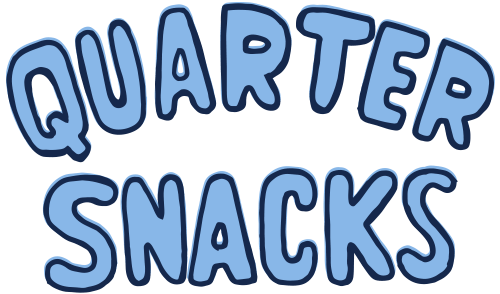
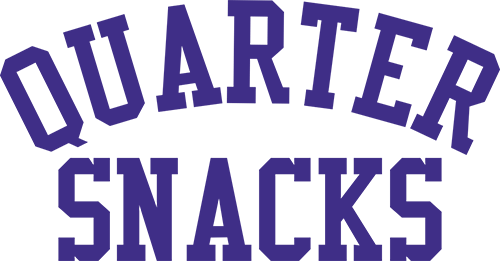

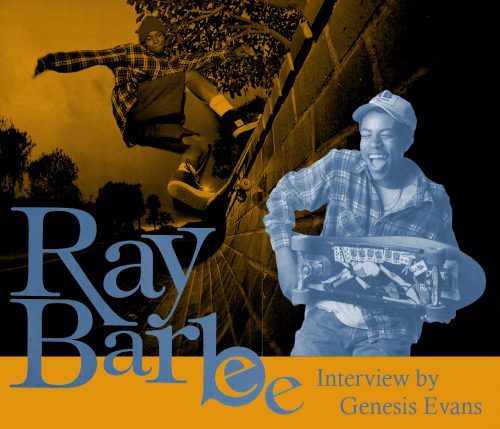
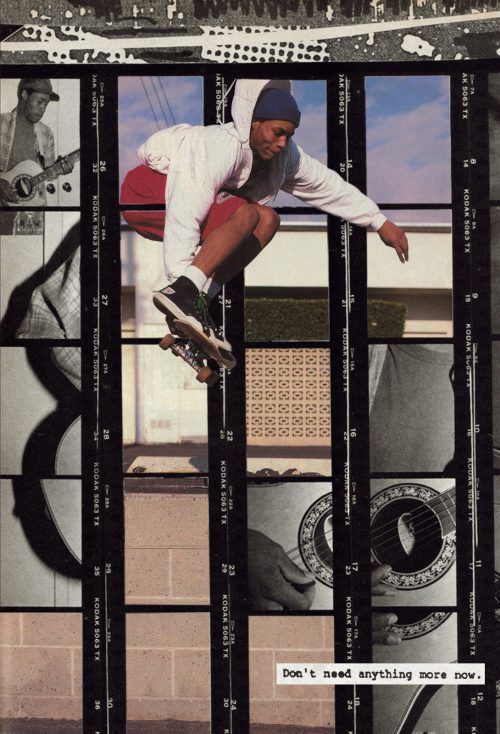
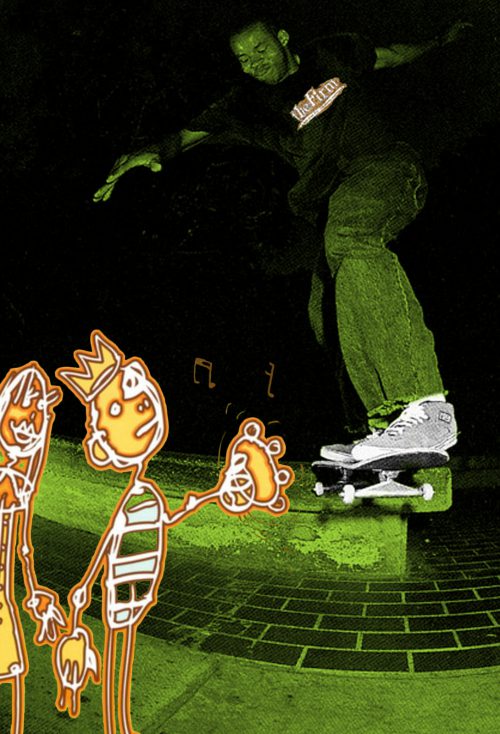
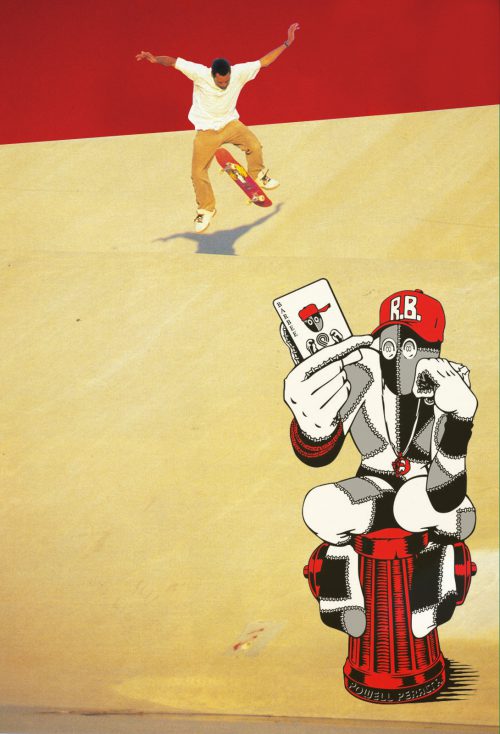
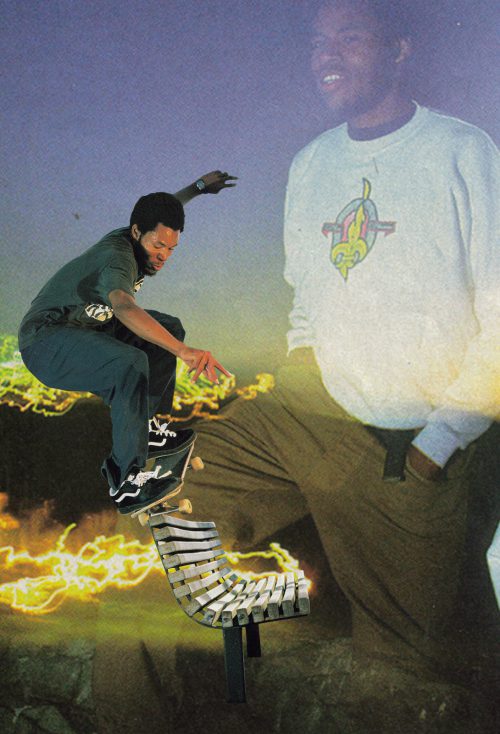
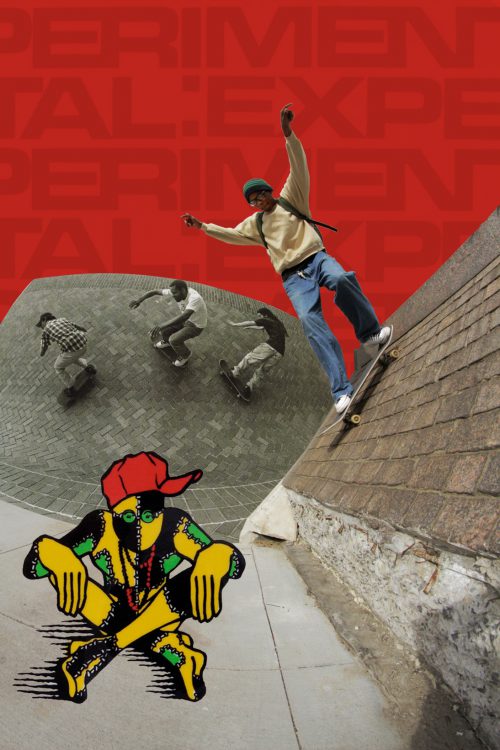
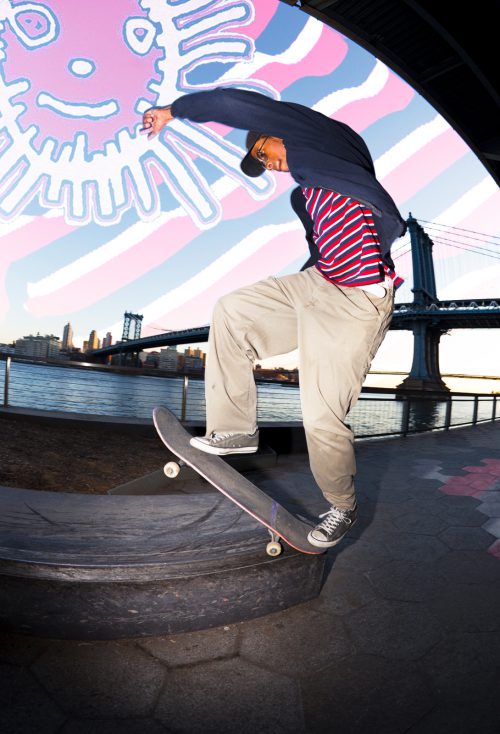
Damn, that was a really rad interview. You can tell Genesis is hyped on Ray. Such a cool dynamic between the two of them.
Can you drop a link to some of his music?
Please make That Watt, Treece & Barbee collabo HAPPEN!
Is it me or do some of the pics not look like Ray? Especially the last one looks like a young kid and another looks like Ron Chapman.
Those pictures are of Genesis, who did the interview.
might have a been a wave to label the photos considering their likeness…
or the swag could be to realize that a 16 year old ray barbee wouldn’t be skating a new york spot that’s only existed since like 2010. sorry if i’m being, like, extra
ray also appears to have much better eyesight